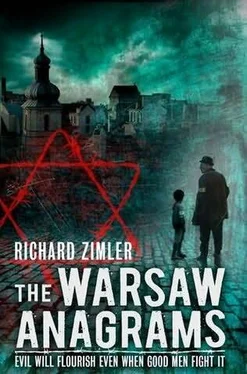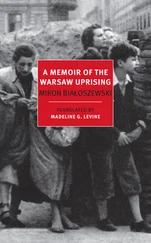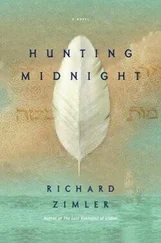Grudgingly, I have to admit that I have come to believe in magic, though I remain an atheist. A paradox? Probably, but what could be more common than that?
On waking and going to sleep, I’d picture Liesel sitting with Petrina on a beach near Izmir. I wrote long letters to her in my head, and while I was polishing watches, I’d often daydream about her, though my favourite fantasy was of Izzy surprising Louis – appearing at his door one day, unannounced. In my mind, the two men embraced for a long time, and then went for an arm-in-arm promenade along the Seine. Sometimes I joined them for tea and cake at Les Deux Magots.
I lived inside my head. For hours at a time, I’d walk through the Warsaw of my childhood and the London of my honeymoon, and the tours I took by myself – and sometimes with Hannah – kept a small pale flame alive inside me.
Come September, I was nearly always freezing, and often sapped of strength by a cold or diarrhoea. My body had become a cumbersome nuisance, and – like most of the men – I longed to be able to discard it.
*
There were a thousand of us in the camp – a thousand moths caught in a black and red lamp, fluttering against the glass of our Jewish identities.
But one of us found a way out, and his escape soon became mine as well.
On the morning of 7 December, our German guards noticed that a prisoner from Lublin named Maurice Pilch was missing. He had been a tannery worker. It was later discovered that he had concealed himself inside a shipment of hide bound for Austria. In effect, he’d mailed himself to Graz for Hanukkah!
The camp inmates were cheered by Maurice’s witty escape, but only briefly; the commandant, Wolfgang Mohwinkel, decided to execute ten men to compensate for Pilch’s effrontery.
An hour or so after this news spread through the camp, Chaim, Jan, Jakub and I heard screaming outside the barracks where we worked and rushed outside. Two guards had caught a teenaged prisoner and pinned him to the ground. One of them had his right knee pressing hard into the young man’s chest. We called this particular guard Caligula, because he enjoyed murder and was good at it. So far, he’d shot seven men for sport as they sat on the latrine.
Caligula told us gleefully that the boy was one of the ten Jews to be hanged. ‘The commandant likes ’em young!’ he gloated, as though he were talking about rape.
The trapped teenager had freckles and stiff blond hair like a brush. Chaim knew his name – Albert – and that he worked in the printing shop with his father. They were from Radom.
Caligula soon took away his knee and pressed his club over Albert’s neck so that he’d stop screaming.
I learned that day that a boy will punch and kick like a demon to see his seventeenth birthday, even if his windpipe is being crushed and he is unable to draw any breath.
‘He looks like a beetle on his back,’ Jakub whispered in a sneering tone.
After what seemed an excruciatingly long struggle, though it may have been only half a minute, Albert stopped gagging and flailing. His arms relaxed and his head sagged to the side. His eyes closed.
I thought he was dead, but the guard knew differently. Sensing a good time to be had, he eased off on the boy’s neck. After a second or two, Albert’s eyes fluttered open and he gulped for breath. He tried to sit up, but Caligula pushed him back down.
The Nazi brute called me over. ‘Stand on the ends of my club!’ he ordered.
Albert’s brown eyes shifted urgently to me, pleading for mercy. He tried to speak, but the German pressed down harder.
The weight of even my flimsy body would have broken the young man’s neck, so I shook my head.
‘Stand on the club or I’ll shoot him!’ Caligula yelled at me.
‘I can’t,’ I replied, though I knew he would carry out his threat.
‘Do it, you Jewish pig!’ he shouted.
‘Take me instead,’ I told him; it was all I could think of saying that would end this stalemate, though I admit I wanted to retract my offer a moment later.
But Caligula didn’t give me time for that.
‘You? Why should we waste our time killing an old man like you?’ he demanded contemptuously.
I felt cornered, and all I had with me was the truth. ‘Because I’m more dangerous to you than the boy,’ I replied.
‘And why is that?’ he asked, amused.
‘Because he’s young and may forget you if he goes on to lead a happy life, but I won’t. I’ll write about what you did to us and then dance on your grave.’
The malevolent guard smiled at me and lifted his club from Albert’s neck, as if my courage to speak my mind had purchased both of us our lives, but by now I was aware that the Nazis adored playing a game called Fool the Jew. I sensed the worst and raised my hand for mercy. And to cut a deal. ‘If you let us both live, I’ll tell you where to find some ruby earrings that I’ve…’
Rearing back with his club, Caligula ended my plea by giving Albert so brutal a blow to his head that the crack of his skull sounded like a branch being snapped.
The young man groaned. His head sagged, and his arms went limp.
The German kept hitting Albert until blood was flowing down his face on to the ground.
When he was done, he stood over the boy like a prizefighter posing for cameras. It was his theatricality that made me realize how vain our Nazi guards were, all of them eager to be stars in their very own Leni Riefenstahl film.
When the flashbulbs in his head stopped going off, he pointed his club at me. ‘You!’ he snarled. ‘You’re number ten now!’
The body has a life of its own; when the noose was placed around my neck, the constriction that had gripped my gut for the last few days burst open. Several hundred men were watching, but none laughed at the moist sag I’d made in the seat of my rumpled trousers. I wished I could have recited a verse of poetry equal to all the damned and shipwrecked faces around me, but my mind was dim, as if a sack had been placed over my thoughts, which were all jumbled together.
I remember looking for Izzy, thinking that seeing his face would help me to leave this world. When I recalled that he wasn’t with me any longer, my heart dived towards a panic so wide and deep that I felt as if I would never hit bottom.
I wanted one of Kolmosin’s incantations now – one that would make me land on the solid ground I’d known at Liza’s farm, even if it meant my back would be broken.
And I wanted a phrase of wisdom that would sum up what I’d learned over the course of my life.
I wanted more time. And more words.
I spotted Jakub. Hate is eternal , he was telling me with his ugly frown.
That was when I realized he’d needed a mortal enemy to keep himself alive.
A man in front – I’ll never know his name – diverted my attention with a small wave. He was bent and twisted, like a bonsai plant. He was crying.
His tortured form had made him understand what I couldn’t say. I was sure of it.
He held me through his jade-coloured eyes, and he assured me with all he was that I didn’t need to find any wisdom. All I had ever done and thought added up to Erik Cohen and that was enough.
I thanked him silently for his tears.
I made believe that Hannah, Stefa and Adam would welcome me beyond death.
Near the end, I heard a melody from out of my childhood, a folk song called ‘ Hänschen Klein ’ that my mother always sang in a mixture of Yiddish and German – and that I’d taught to Adam when he was tiny. Had I started to sing or had the man in front? I didn’t know. My senses were clouded by too great a wish for life.
When the hangman pulled the chair out from under my feet, I tried to hold my breath, but the taut heaviness of my own weight squeezed the air from me. Choking, I pulled at the ropes binding my hands, but the pressure drawing me down was too greedy.
Читать дальше












